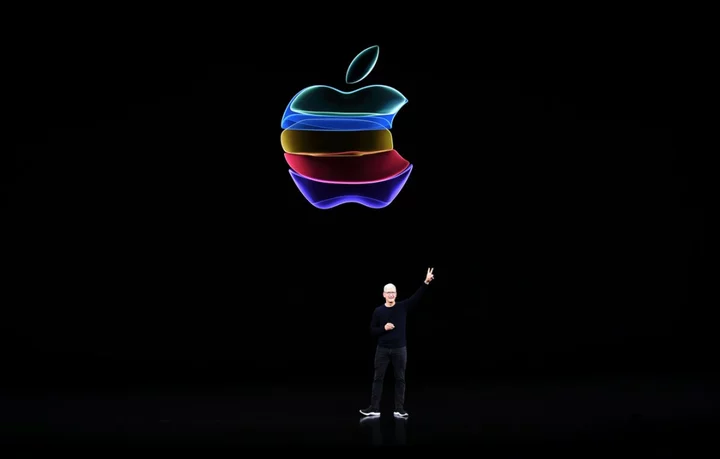ESG funds that piled into green bonds sold by Thames Water Plc are now trying to figure out what the environmental, social and governance disasters threatening the future of the utility mean for their holdings.
The company, whose mismanagement left Britain’s rivers fouled with raw sewage, has sold four green bonds since the beginning of 2022, for a nominal total of €2.8 billion ($3 billion). More than 200 ESG funds purchased some of the debt, with their holdings having a market value of roughly $240 million, according to data compiled by Morningstar Direct.
Green bonds stand out in the world of ESG debt due to their strict use-of-proceeds requirement: Issuers promise investors that the money they get from selling the bonds will only pay for pre-defined green activities.
Thames Water, which is the subject of regulatory and parliamentary probes and may be put into a special administration, has been a regular issuer of green debt. Its four most-recent issuances are still rated investment grade by Moody’s Investors Service and S&P Global, though S&P has said downgrades may be ahead.
Read More: Thames Water Debt Placed at Risk of Downgrade by S&P
The scandal is forcing investors to question whether it’s acceptable to hold green bonds from an issuer that is damaging the environment, even if the specific proceeds get channeled into green works. Funds at Goldman Sachs Group Inc.’s investment arm and Columbia Threadneedle recently ranked among the largest ESG holders, according to Morningstar.
“A green bond from a not-so-green issuer isn’t sustainable,” said Saida Eggerstedt, the head of sustainable credit at Schroders Plc. She dumped Thames Water’s green debt from her portfolio last year, as news of the sewage leaks dominated headlines.
Eric Pedersen, head of responsible investments at Nordea Asset Management, says he explicitly avoided bonds issued by Thames Water for similar reasons.
“We don’t want any so-called green bonds that are some kind of greenwashing exercise,” he said.
A spokesperson for Goldman Sachs declined to comment, while a representative for Columbia Threadneedle wasn’t immediately able to comment.
Read More: Goldman Fund Arm Rejects 36% of ESG Debt on Quality Concern
The UK Sustainable Investment and Finance Association (UKSIF), whose members oversee more than £19 trillion ($24 trillion) and include JPMorgan Chase & Co. and Barclays Plc, has also weighed in. James Alexander, the association’s chief executive officer, said the Thames Water scandal makes clear that green bond investors can’t be “blindly ignoring all the other things that are going on with the company.”
“Clearly something has gone very badly wrong here and the reasons why that’s happened need to be investigated,” he said.
Read More: Thames Water Is Drowning in Debt. What Went Wrong?: QuickTake
Thames Water’s environmental failures have erupted into a major scandal that’s rocked Britain and left investors in the company facing considerable losses. The government is now discussing whether to temporarily nationalize the crisis-stricken utility, as the full scale of its failures becomes apparent.
In all, the company has more than £14 billion of debt. It may need to write down £3.6 billion of that if the government takes over control, according to Bloomberg Intelligence.
Thames Water has been trying to reassure investors and the public that it has enough money to weather the crisis. That includes £4.4 billion of cash and committed funding as of March 31. Last week, Ofwat, the regulator, characterized that buffer as “strong liquidity,” while acknowledging the company needs to work on its financial resilience and environmental record.
There also may be more cash coming from shareholders, which include China’s state-owned sovereign wealth fund, as they look into a capital injection of £1 billion, according to a report in The Times.
Thames Water, which is owned by Kemble Water Holdings Ltd., is the UK’s largest water utility providing services for 15 million people in London and the South East. After years of underinvestment in Britain’s privatized water utilities, the nation has faced regular bouts of sewage leaking into clean water. Those leaks coincided with millions of Britons facing water restrictions.
At the same time, Thames Water has awarded bonuses to managers and dividends to investors. CEO Sarah Bentley resigned at the end of June.
Adrian Montague, a city veteran brought in to replace Bentley last week, has said he’s looking “forward to working with the board and executive team and Thames Water’s regulators and investors, to focus on the company’s turnaround plan and its future financing needs.”
In political circles, meanwhile, “there’s a lot of anger,” according to Vince Cable, a former UK business secretary. UK water utilities “have failed to deliver,” he said in a Bloomberg Television interview on Tuesday with Anna Edwards.
The Thames Water debacle is also unfolding as ESG investors face a general shortage of water assets. Fund managers, including Federated Hermes, have bemoaned the lack of water-related securities as they try to build strategies that address the threat of scarcity facing much of the world.
“While I like water as a theme — access to essential services — the adverse impact” of Thames Water’s operations “seemed material,” said Eggerstedt, who oversees a €1.1 billion fund. “I wish these companies had good governance. It is sad.”
--With assistance from Sheryl Tian Tong Lee.
(Adds reference to efforts to get comments from Goldman Sachs and Columbia Threadneedle.)









